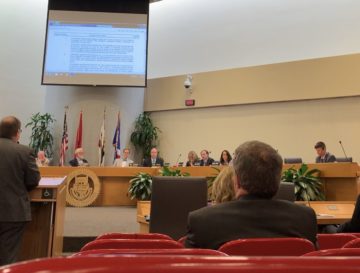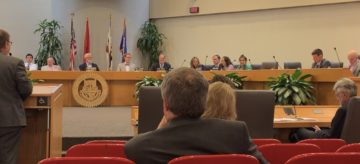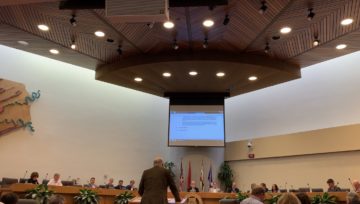Things got heated at the Knoxville City Council meeting Tuesday night, as Knoxville decision-makers showed they are listening to constituents, and question the Knoxville Utilities Board's (KUB) high mandatory fixed fees on customers’ electric bills. Laura Humphrey, former Energy Policy Associate at the Southern Alliance for Clean Energy also contributed to this blog.
Guest Blog | June 7, 2019 | Energy Efficiency, Energy Justice, Tennessee, UtilitiesThe KUB Board has already ignored over 3,000 petition signatures telling them to Freeze the Fees. Will they be able to ignore the Knoxville City Council too? It’s getting tougher, as three council members questioned KUB’s CFO Mark Walker about KUB’s high fixed fees at the June 4 City Council meeting. Walker responded by blaming KUB’s Board.
Have you already signed the petition to tell KUB to Freeze the Fees? If you have, thank you for taking the first step to help Renew TN! Join us at our next Renew TN Event!
On Tuesday night, Walker presented a resolution for revenue bonds to Knoxville’s City Council. KUB revenue bonds are for infrastructure and are not closely tied to the fixed fees, but are repaid using revenue from customers, regardless of whether that revenue comes from fixed fees or usage rates. The bonds are important for updating infrastructure, and we are glad the resolution passed unanimously.
We are also glad the City Council used this opportunity – one of only three annually – to comment and ask questions of KUB, a city-owned utility. Since KUB operates quite independently of the city government, it’s a rare chance for council members to be a voice for their constituents on utility issues.
While the resolution was being read, Council members Marshall Stair’s and Seema Singh’s lights flickered on, signaling that they wanted to speak.
After hearing complaints and concerns from constituents, Council member Stair kindled the conversation by questioning KUB’s plan for raising the fixed fees Knoxvillians see on their monthly electric bills, and asked whether or not the fees would continue to rise.

“As the fixed part of the bill rises, that has more of an adverse [impact] on lower income people; because they typically have smaller homes, a bigger part of their bill would be the fixed part… If more of [KUB’s] revenue comes from the fixed part [of the bill], there’s less incentives to modernize and invest in energy efficiency.” – Knoxville Councilmember Marshall Stair
Stair acknowledged Knoxville Mayor Madeline Rogero’s recent presentation on proposed carbon goals for the city of Knoxville at the previous city council meeting and “wanted to make sure the incentives [to conserve energy] were right for reducing Knoxville’s carbon footprint.”
Councilmember Singh stoked the fire when she brought out her most recent KUB bill. She stated that her last bill totaled $95. Only $15 of that bill was from actual usage, while $80 were exclusively attributed to fixed fees. Singh herself practices energy conservation efforts: “hanging her laundry outside to dry, keeping her windows open [instead of using her A/C unit].”

SACE has been focused on the electricity piece of the bill, and the dramatic electric fixed fee increases since 2010 that tripled from $6 to $19, which all customers have to pay before they even flip on the first light switch. However, customers like Singh with other KUB services have water, wastewater, electric, and gas fixed fees on their monthly bill, which means they may be paying up to $80 across all services.
Singh highlighted the lack of motivation that customers have to practice energy conservation efforts:
“When people are working really hard and it’s an issue that whole city is working on…this doesn’t encourage me to be more efficient. If I leave my house to go on vacation, I’m still paying that amount. Even if my usage was doubled by 100%, my usage [cost] would only be $30. For a couple of dollars a day, I could not worry about efficiency.” – Knoxville Councilmember Seema Singh
Singh went on to say that low-usage groups like elderly, fixed income, low-income, and single resident households would benefit from KUB collecting revenue for infrastructure and reliable service in the the usage part of the bill rather than a fixed fee that customers have no control over.
The fire was blazing when a third city council member, Gwen McKenzie, added fuel. She agreed with Stair and Singh’s previous statements and scolded KUB for charging an additional $8 to deliver pink slips to customers for lack of payment. The high cost to be disconnected and reconnected can drive customers to forgo other basic needs like food and medicine just to keep from being disconnected. Walker’s response to Mckenzie’s comment was to attribute the $8 pink-slip charge to “pay workers to deliver the slip.”
After all resolutions have been presented to the City Council, the public is allowed to voice their concerns and ask questions to the board. Although new to Knoxville, Renew TN volunteer Kent Minault is an active voice in the Scruffy City. Minault, who is retired himself, expressed his concern that KUB’s rising fixed fees are “disproportionately saddled on the shoulders of our most vulnerable people.”

Minault went on to say, “The fees are a small part of the bill for someone who consumes a lot, but a big part of the bill for someone who is struggling to make ends meet.” Minault suggested KUB reassess how they structure their bill to be more balanced based on usage level while still allowing KUB to collect revenue for their fixed costs.
We applaud City Council members Stair, Singh, and McKenzie for doing their own research, listening to constituents’ stories, and advocating for Knoxvillians. For too long KUB and its Board have ignored the high energy burden in Knoxville, the public voice, and their duty to serve the people as a public power utility. KUB has listened more from the top down (TVA) than the bottom up (customers, Knoxville decision-makers).
It’s up to the citizens of Knoxville and our leaders to stand united and put the public back in public power by giving all Knoxvillians a voice in the rate-making process. Knoxvillians deserve to control their energy bills, have safe, healthy homes, and shouldn’t have to decide between paying for food, medicine, or keeping their lights on.
Ready to take action with us? Join us at our next Renew TN Community Meeting or event! Learn how together, we can Renew TN with solutions for Knoxville to relieve energy burdens, increase access to clean, renewable energy, and put the public back in public power.
Want to know more about Knoxville carbon goals and neighboring city Nashville’s plan to clean up energy, transportation, and buildings? Stay tuned!